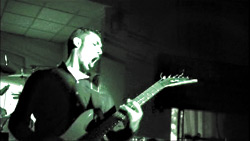The first time I fell in love with heavy metal is so distinct that I can still practically smell it. Whenever I smell Tide detergent, I am instantly in the rec room adjacent to the dryer in my neighbor’s basement, listening to the gorgeous waterfall of power chords that make up the descending riff of “The Trooper” by Iron Maiden. I press the headphones so tightly to my ears that they turn bright red. I can’t imagine hearing another sound more empowering, invigorating, or terrifying. I’m hooked for life in an instant.
Even though my tastes expanded broadly as I grew up, being an obsessive metalhead is something I never grew out of (I think my father is still hoping I will someday). Metal creates lifelong loyalty among its followers in a way that few other genres can touch because it’s both galvanizing and comforting. Whereas indie rock breeds terribly boring elitism, and punk rock often produces unproductive self-righteousness (albeit with a good cause occasionally tucked under its arm), heavy metal generally produces a euphoric sense of solidarity among its followers and a tremendous level of escapism. It makes all the sense in the world that young Iraqi men seeking a reprieve from the horror and violence of war would be drawn to it.
“It’s a modern form of tribalism,” agrees Canadian-born documentary filmmaker Eddy Moretti via phone from his current home in New York City. “There’s definitely an international language of metalheads.” During time away from their shared duties running the burgeoning Vice media empire (which now includes film, recording, television, and publishing arms), Moretti and co-director Suroosh Alvi spent five years following Acrassicauda (Latin for “black scorpion”), Iraq’s only known heavy-metal band. Heavy Metal in Baghdad screened at the Seattle Film Festival last Saturday; it will be released on DVD on June 10.
Firas Al-Lateef, Tony Aziz, Marwan Reyad, and Faisal Talal, the four band members, are smart, passionate, and creatively dedicated 20-somethings raised on Slayer and Metallica who exude the familiar, agitated energy of your average ambitious band of rockers. But timing and geography are working against them in ways that no American band could even imagine. Unsurprisingly, playing Western-influenced heavy metal in an Arab country is frowned upon to a potentially fatal degree. The act of headbanging itself is risky, purportedly because of its similarity to Jewish prayer rituals, and coordinating live shows is a true nightmare. When asked why metal is their chosen genre, bassist Al-Lateef simply gestures out the window to the bomb-ravaged neighborhood outside. “Look around—we are living in a heavy-metal world.” Indeed, few things could be deemed as authentically metal as the act of carrying cans of gasoline to band practice to power the generators you plug your amp into.
Originally inspired by a Vice profile written by MTV News correspondent Gideon Yago in 2003 and feeling like a more crudely shot and harrowing version of Behind the Music, Heavy Metal in Baghdad follows the band from their hopeful start in the shadow of Saddam Hussein’s reign to their eventual escape to Syria, after life in Iraq crumbles to an untenable level. (They are currently living as refugees in Istanbul with the help of the filmmakers and PayPal donations from metal fans around the world.) Watching them struggle bravely to keep their dreams alive is both inspiring and heartbreaking, especially considering the brief window of hope they had before the country plunged into bloody mayhem after Hussein was ousted.
“The country felt some reprieve for an instant,” explains Moretti. “People originally thought [U.S. forces] did the right thing—but that only lasted a couple of months. If you go to Iraq now and experience the level of chaos, frustration, and misery, it’s hard to imagine there was this moment when people legitimately thought the country was entering a new and better era.”
Aside from the obvious goal of bringing more attention to the band’s plight and increasing their chance of getting working visas to tour the States (at press time, an interview between Acrassicauda and the Department of Homeland Security in Turkey was pending), Moretti just wants people to feel more conscious about the lesser-known ravages of war. “I just want people to walk away with a sense of the real people on the other side of this war—the innocent victims of the war,” he says. “There’s not much in the news cycle right now about the war except for how it impacts the presidential election. Just take a moment to think about the real people that have gotten caught up in this fight. Think about how hard it would be to get your life back on track if your home was destroyed by war.”








